
Alvin Clarence Thomas was an American gambler, golfer, and hustler, who killed five men but was never charged with a crime, better known as Titanic Thompson.

The Color of Money is a 1986 American sports drama film directed by Martin Scorsese. It is the sequel to the 1961 film, The Hustler. Like the previous film, The Color of Money is based on the novel of the same name by Walter Tevis.
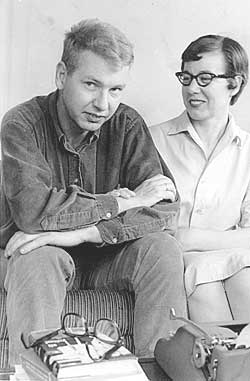
Walter Stone Tevis Jr. was an American novelist and screenwriter. Three of his six novels were adapted into major films: The Hustler, The Color of Money and The Man Who Fell to Earth. A fourth, The Queen’s Gambit, was adapted into a miniseries with the same title and shown on Netflix in 2020. His books have been translated into at least 18 languages.

William Joseph Mosconi was an American professional pool player from Philadelphia, Pennsylvania. Mosconi is widely considered one of the greatest pool players of all time. Between the years of 1941 and 1957, he won the World Straight Pool Championship nineteen times. For most of the 20th century, his name was essentially synonymous with pool in North America – he was nicknamed "Mr. Pocket Billiards" – and he was among the first Billiard Congress of America Hall of Fame inductees. Mosconi pioneered and regularly employed numerous trick shots, set many records, and helped to popularize pool as a national recreation activity.
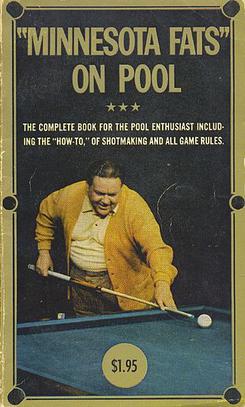
Rudolf Walter Wanderone, commonly known as Minnesota Fats, was an American professional pool player. Although he never won a major pool tournament as "Fats", he was at one time perhaps the most publicly recognized pool player in the United States—not only as a player, but also as an entertainer. Wanderone was inducted in 1984 into the Billiard Congress of America Hall of Fame for his decades-long public promotion of pool.
Hustling is the deceptive act of disguising one's skill in a sport or game with the intent of luring someone of probably lesser skill into gambling with the hustler, as a form of both a confidence trick and match fixing. It is most commonly associated with, and originated in pocket billiards (pool), but also can be performed with regard to other sports and gambling activities. Hustlers may also engage in "sharking"—distracting, disheartening, enraging, or even threatening their opponents—to throw them off. Hustlers are thus often called "pool sharks". Professional and semi-pro hustlers sometimes work with a "stakehorse"—a person who provides the money for the hustler to bet with —in exchange for a substantial portion of all winnings. Another form of hustling is challenging "marks" to bet on trick shots that seem nearly impossible but at which the hustler is exceptionally skilled. Chess hustlers are quite common in urban areas in the United States and elsewhere, often offering speed chess against any takers. Unlike most hustlers, chess hustlers are often assumed to be skilled and are seen as a challenge.
Hustler or hustlers may refer to:
Don Willis was a colorful pool hustler from Canton, Ohio, who was considered one of the greatest money players of all time. In the late 1940s and 1950s, when pool was in decline and cash prizes for pool tournaments did not pay enough for a full-time income, Willis chose to travel America playing private pool games for money alongside world champion Luther Lassiter.
Fast Eddie or Fast Eddy may refer to:

Minnesota Fats, or George Hegerman, is a fictional pool hustler created by American novelist Walter Tevis.

The Hustler is a 1961 drama film, directed by Robert Rossen. It tells the story of small-time pool hustler "Fast Eddie" Felson, who challenges legendary pool player "Minnesota Fats".

Keith McCready is an American professional pool player who played under the nickname "Earthquake". At one time considered among the top players in America, McCready has been a traveling tournament competitor and notorious hustler since the 1970s. Known for comedically interacting with the audience during matches, McCready was also a contributing writer for InsidePool magazine between 2003 and 2006. He also had a supporting role as the hustler Grady Seasons in the 1986 film The Color of Money.

William "Bill" Paul Staton, was an American professional pool player and restaurateur, nicknamed Weenie Beenie.
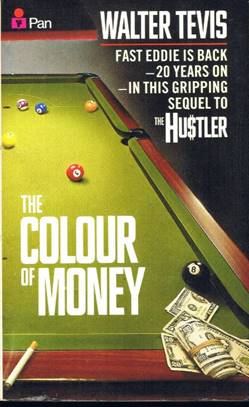
The Color of Money is a 1984 novel by American novelist Walter Tevis. It is the sequel to his 1959 novel, The Hustler. It was his sixth and final book before his death in the year of publication.

The Queen's Gambit is a 1983 American novel by Walter Tevis, exploring the life of fictional female chess prodigy Beth Harmon. A bildungsroman, or coming-of-age story, it covers themes of adoption, feminism, chess, drug addiction and alcoholism. The book was adapted for the 2020 Netflix miniseries of the same name.
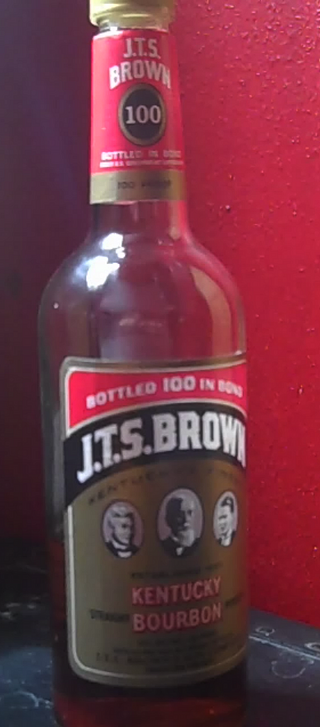
J. T. S. Brown is a Kentucky bourbon whiskey produced by the Heaven Hill Distillery company. The distilling operation is in Louisville, Kentucky, and aging and bottling operations are in Bardstown, Kentucky. The primary expression of the brand is 40% alcohol by volume (ABV), or 80 U.S. proof. There is also a 100 proof bottled in bond version.

Myron McCormick was an American actor of stage, radio and film.
"Pool Hall Blues" is a 1990 episode of the American science fiction television series Quantum Leap. Lead character Sam Beckett "leaps" into the body of an African American man in 1954: Charlie "Black Magic" Walters, one of the (fictional) greatest pool players in America, and a childhood mentor of supporting character Al. Beckett as Walters must help Walters's granddaughter keep her Chicago nightclub and rescue it from under the corrupting influence of a criminal loan shark. The episode, the 18th of season 2, was written by Randy Holland and directed by Joe Napolitano. It originally aired on March 14, 1990. The episode won the series its second of three consecutive Primetime Emmy Awards for Outstanding Cinematography.
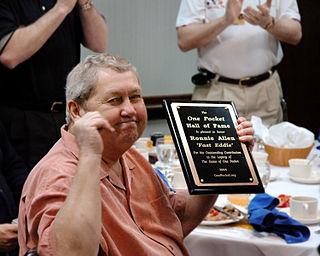
Ronnie Monroe "Fast Eddie" Allen was an American professional pool player. He was labeled as a pool "super star" in the prime of his pool-shooting career by his peers during pool's golden era.
"Fast Eddie" Parker was an American pool player, claimed by many to have been the inspiration for the character "Fast Eddie" Felson in the 1959 Walter Tevis novel The Hustler. In both the 1961 film adaptation and the 1986 sequel, Felson was played by Paul Newman.














